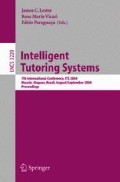Abstract
This research describes a probabilistic approach for developing predictive models of how students learn problem-solving skills in general qualitative chemistry. The goal is to use these models to apply active, real-time interventions when the learning appears less than optimal. We first use self-organizing artificial neural networks to identify the most common student strategies on the online tasks, and then apply Hidden Markov Modeling to sequences of these strategies to model learning trajectories. We have found that: strategic learning trajectories, which are consistent with theories of competence development, can be modeled with a stochastic state transition paradigm; trajectories differ across gender, collaborative groups and student ability; and, these models can be used to accurately (>80%) predict future performances. While we modeled this approach in chemistry, it is applicable to many science domains where learning in a complex domain can be followed over time.
Access this chapter
Tax calculation will be finalised at checkout
Purchases are for personal use only
Preview
Unable to display preview. Download preview PDF.
References
Anderson, J.D.: Cognitive psychology and its implications. W.H. Freeman, San Francisco (1980)
Chi, M.T.H., Glaser, R., Farr, M.J. (eds.): The Nature of Expertise, pp. 129–152. Lawrence Erlbaum, Hillsdale (1988)
Chi, M.T.H., Bassok, M., Lewis, M.W., Reinmann, P., Glaser, R.: Self- Explanations: how students study and use examples in learning to solve problems. Cognitive Science 13, 145–182 (1989)
VanLehn, K.: Cognitive Skill Acquisition. Annu. Rev. Psychol. 47, 513–539 (1996)
Schunn, C.D., Anderson, J.R.: The generality/specificity of expertise in scientific reasoning. Cognitive Science (2002)
Corbett, A.T., Anderson, J.R.: Knowledge tracing: Modeling the acquisition of procedural knowledge. User Modeling and User-Adapted Interaction 4, 253–278 (1995)
Schunn, C.D., Lovett, M.C., Reder, L.M.: Awareness and working memory in strategy adaptivity. Memory & Cognition 29(2), 254–266 (2001)
Haider, H., Frensch, P.A.: The role of information reduction in skill acquisition. Cognitive Psychology 30, 304–337 (1996)
Alexander, P.: The development of expertise: the journey from acclimation to proficiency. Educational Researcher 32(8), 10–14 (2003)
Stevens, R.H., Ikeda, J., Casillas, A., Palacio-Cayetano, J., Clyman, S.: Artificial neural network-based performance assessments. Computers in Human Behavior 15, 295–314 (1999)
Underdahl, J., Palacio-Cayetano, J., Stevens, R.: Practice makes perfect: assessing and enhancing knowledge and problem-solving skills with IMMEX software. Learning and Leading with Technology 28, 26–31 (2001)
Lawson, A.E.: Science Teaching and the Development of Thinking. Wadsworth Publishing Company, Belmont (1995)
Olson, A., Loucks-Horsley, S. (eds.): Inquiry and the National Science Education Standards: A guide for teaching and learning. National Academy Press, Washington (2000)
Linacre, J.M.: WINSTEPS Rasch measurement computer program. Chicago. Winsteps.com (2004)
Stevens, R.H., Najafi, K.: Artificial neural networks as adjuncts for assessing Medical students’ problem-solving performances on computer-based simulations. Computers and Biomedical Research 26(2), 172–187 (1993)
Rumelhart, D.E., McClelland, J.L.: Parallel distributed processing: Explorations in the Microstructure of Cognition. Foundations, vol. 1. MIT Press, Cambridge (1986)
Stevens, R., Wang, P., Lopo, A.: Artificial neural networks can distinguish novice and expert strategies during complex problem solving. JAMIA 3(2), 131–138 (1996)
Casillas, A.M., Clyman, S.G., Fan, Y.V., Stevens, R.H.: Exploring alternative models of complex patient management with artificial neural networks. Advances in Health Sciences Education 1, 1–19 (1999)
Rabiner, L.: A tutorial on Hidden Markov Models and selected applications in speech recognition. Proc. IEEE 77, 257–286 (1989)
Kohonen, T.: Self Organizing Maps, 3rd extended edn. Springer, Heidelberg (2001)
Soller, A.: Understanding knowledge sharing breakdowns: A meeting of the quantitative and qualitative minds. Journal of Computer Assisted Learning (2004) (in press)
Soller, A., Lesgold, A.: A computational approach to analyzing online knowledge sharing interaction. In: Proceedings of Artificial Intelligence in Education, 2003, Australia, pp. 253–260 (2003)
Lesgold, A., Katz, S., Greenberg, L., Hughes, E., Eggan, G.: Extensions of intelligent tutoring paradigms to support collaborative learning. In: Dijkstra, S., Krammer, H., van Merrienboer, J. (eds.) Instructional Models in Computer-Based Learning Environments, pp. 291–311. Springer, Berlin (1992)
Lajoie, S.P.: Transitions and trajectories for studies of expertise. Educational Researcher 32, 21–25 (2003)
Giordani, A., Soller, A.: Strategic Collaboration Support in a Web-based Scientific Inquiry Environment. In: European Conference on Artificial Intelligence, “Workshop on Artificial Intelligence in Computer Supported Collaborative Learning”, Valencia, Spain (2004)
Author information
Authors and Affiliations
Editor information
Editors and Affiliations
Rights and permissions
Copyright information
© 2004 Springer-Verlag Berlin Heidelberg
About this paper
Cite this paper
Stevens, R., Soller, A., Cooper, M., Sprang, M. (2004). Modeling the Development of Problem Solving Skills in Chemistry with a Web-Based Tutor. In: Lester, J.C., Vicari, R.M., Paraguaçu, F. (eds) Intelligent Tutoring Systems. ITS 2004. Lecture Notes in Computer Science, vol 3220. Springer, Berlin, Heidelberg. https://doi.org/10.1007/978-3-540-30139-4_55
Download citation
DOI: https://doi.org/10.1007/978-3-540-30139-4_55
Publisher Name: Springer, Berlin, Heidelberg
Print ISBN: 978-3-540-22948-3
Online ISBN: 978-3-540-30139-4
eBook Packages: Springer Book Archive

